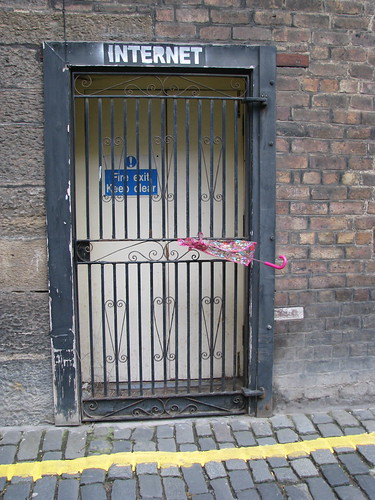 |
| (Kyz) |
With the goal of blocking sites which traffic in copyrighted material, SOPA would give the attorney general the power to create a blacklist of sites which would be blocked by ISPs and search engines. However, the bill is very broadly written, and the legislation would essentially end the safe harbor provisions of the DMCA. All it would potentially take is one infringing file to take down an entire website – creating, as TechCrunch calls it, a “perfectly legal kill switch for any site on the internet.” Or, as Eric Schmidt put it, “[the bill] would require (Internet service providers) to remove URLs from the Web, which is also known as censorship last time I checked (emphasis mine)." It should be noted that, from a technical standpoint, the legislation wouldn’t stop piracy. As Nancy Scola pointed out in Salon “Hard-core pirates are simply going to traffic in IP addresses. For example, copy and paste “194.71.107.15″ in your browser. The Pirate Bay should still pop up, and there’s nothing Google can do about it.”
This legislation could potentially have serious effects on internet marketing. The law not only creates a blacklist, but it gives it gives intellectual property rights holders the ability to ask payment providers and ad networks to stop working with infringing sites, which could cripple a site financially. Eliminating the safe harbor provisions would most likely end marketing campaigns which include user generated content (i.e. contests with videos), as the liability for the sites would be significantly higher. Additionally, in a recent study by Booz & Company, holding websites responsible for the content uploaded by users would reduce the pool of interested angel investors by 81%.
The legislation not only impacts companies, but it could impact consumers as well. The bill includes provisions which could consider posting any copyrighted material a felony. FreeBieber.org believes that, under the new laws, Justin Bieber could potentially face 5 years in prison for posting covers of other peoples’ music (which, though it happens, is not a fair use of copyrighted material). However, this would also affect people like Stephanie Lenz, whose use of Prince’s song “Let’s Go Crazy” in a 29 second video of her kids dancing was determined to be fair use. As SOPA makes no provision for fair use, people like Lenz could find themselves in serious trouble. Marketers should all be watching this legislation very, very closely as it could strongly affect our business and make our jobs much more difficult. Yahoo! has already canceled its membership in the US Chamber of Commerce (a supporter of SOPA) over this, Google is threatening to follow suit, and there are a number of petitions on change.org attempting to stop SOPA. What do you think? Sound off in the comments below.
Way to go. Great article and good structure. It reads well and has a lot of links to keep it interesting. The only thing i don't see is your links. Dod you put them in? They are vital to get alumni and marketers to read your blog. Use terms specific to the blog, terms specific to IMC, and terms specific for marketers.
ReplyDeleteYou did the work. You deserve the readers.
A good blog always comes-up with new and exciting information and while reading I felt that this blog has good quality content that qualifies a blog to be a good one. Your Info about Multicultural Marketing agency and Ethnic online advertising really helped me in my research.
ReplyDeleteYou can visit https://ytbuyviews.com/ for youtube marketing, youtube viewership boost and for likes.This is the world's best portal for youtube marketing and promotions.
ReplyDelete